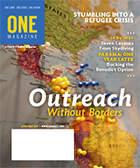
April-May 2016
Outreach
Without Borders
------------------
|






Two Cheers for Differences
By Jackson Watts
What comes to mind when you think about learning?
For some, classroom images come flowing in—textbooks, dry-erase boards, PowerPoint slides, etc. Others associate more on an emotional level. They consider the importance of compassion, patience, trust, and other qualities essential to understanding. Still others are more cognitive or concept-oriented. They ponder the complex intersection of how we acquire new beliefs, recover lost memories, and translate ideas into everyday life.
These are all reasonable associations to the topic of learning. But in such a polarized Western society these “connections” aren’t enough to help us grow disciples deeply rooted in God’s grace. In other words, it isn’t just our different associations with the word learning that make learning itself difficult. It is the features of mainstream American culture that make it a demanding task.
We are increasingly told, for instance, that anything is true (if it works for you). It is thought that meaningful truth can be communicated in 3.2-second sound bites. People assume an issue is framed fairly if they hear it on their preferred news network. Needless to say, numerous forces have and continue to hinder us from truly learning or thinking constructively about learning.
Why We Ought to Care
Despite these challenges, the Church has a vested interest in the matter because learning is presupposed in our discipleship efforts. The word disciple means learner or follower. Thus, it’s no surprise that Jesus’ Great Commission connected the task of “making disciples” to “teaching them all things I have commanded you.” Teaching and learning are at the heart of the Church’s mission and ministry. The word teaching assumes that someone has first learned something in order to share with others.
In many respects, evangelicals have taken admirable steps to obey this command. I regularly hear complimentary words from Methodist, Lutheran, even Catholic friends regarding how Baptists emphasize learning the Bible. This anecdotal claim is supported by the success of many Baptist-affiliated educational institutions, the volume of theological literature available, and other measurable data. Yet no single church (or denomination) can coast on perceived success. In the local church, teaching and learning can never be assumed, but must be woven intentionally into the fabric of congregational life.
One aspect of learning in the church often has led to other problems that plague us. It is the value of difference in the task of learning.
Difference ≠ Problem
When someone says, “So-and-so and I had a difference of opinion,” usually this carries a negative connotation. The “difference” didn’t just signal opposite conclusions, but likely marked the beginning of a conflict in the relationship. People of faith are not immune to this experience, because church life includes people (with differing opinions) who make numerous decisions. Service times must be established, small group sizes determined, song selections made, and vacation Bible school dates set, just to name a few. Such decisions may be guided by scriptural principles, but without specific instructions from God’s Word, people will disagree.
Given the 1) countless decisions to be made about the church’s ministry, 2) deceitfulness of sin, and 3) sheer diversity of people who comprise our congregations, we experience difference as a feature of life in the body. And because differences often lead to conflict, we come to think of difference itself as a problem.
I would argue for a way to view difference that eliminates frustration—that the useful and critical link between learning and difference can help the Church navigate often-choppy waters.
Difference = Being a Student
Explorers have a sense of adventure, optimism, and hope in to do what they do. But they also believe in “something out there,” which they don’t already know or haven’t yet experienced.
Christians could learn a lot from explorers. Too often, after a preliminary assessment of the people around us concludes they’re different—whether by age, personality, or background—we move on to find more “sameness.” We want our opinions affirmed and not challenged. We do not wish to learn a new perspective. The problem comes when this assumes our existing views and opinions are correct. By definition, no one who already knows everything can learn anything. Talk about an obstacle to learning!
Difference is a powerful, seldom-explored opportunity for the Church. First Corinthians 12 tells us that all of the body’s parts are essential to its function, though they are all different. It is precisely other people’s differences—not their sameness—that should drive us into deeper community. Differences promote broader conversation, elicit new questions, and eventually create non-threatening situations in which members of the body discover how they fit together, and how that fit leads to greater fruitfulness for Christ.
Some have mused that if we were all the same, the world would be a boring place. True enough. But if the Church were all the same, we would be ineffective, unable to mirror the transformative, unifying power of God’s grace.
Difference = A Free Education
Difference provides a potentially fruitful opportunity to learn because of how we grow. We not only grow by listening to intelligent people, we grow by listening to people who use different words and metaphors, who have had different experiences, and who emphasize some things over others. Listening teaches us not only about others, but also about the world in which we minister. We can discern people’s values, gifts, problems, and patterns of reasoning. In essence, the more we listen, the less expensive our education becomes.
When people are trying to make a decision, it isn’t uncommon to hear them say, “I don’t know what I’m going to do, but I know I’m not going to do that.” Absent a solution, there is still progress because a false solution has been eliminated. Learning isn’t just about the acquisition of facts but the cultivation of character. It is God’s truth—whether from the natural world or the Scriptures—informing the mind and hammering away at the old self that creeps back onto the throne sometimes.
People’s differences confront us with new possibilities to consider, even if the most we may gain from some encounters is determining what we’re not going to think or do. Yet this is part of spiritual growth: paring old branches so new ones can grow as nurtured by God’s Word, His Spirit, and the saints.
Difference = Gospel-Realization
One of my best friends is a gentleman in his late 70s. We are not only separated by generations, but by health, preferred meal times, preferred Bible translations, and a host of other qualities. Somehow, we have still become quite close. The somehow is, in reality, just the truth of the gospel, which has the power not only to save individuals, but to bring together those separated by distinctions. Even the natural barriers of age, gender, and ethnicity are no match for the power of God’s love.
Indeed, love is the final apologetic, as Francis Schaeffer once said. Authentic love is not only what the Church needs to reach the lost, but to build true community in churches where differences are a fact of life. If we truly are going to learn in order to teach the faith, we must see difference as an opportunity for dialogue and discovery, not drama and division.
About the Writer: Jackson Watts has been pastor of Grace FWB Church in Arnold, Missouri, since August 2011. A graduate of Welch College, Southeastern Baptist Theological Seminary, and Duke Divinity School, Jackson is co-founder of The Helwys Society Forum: www.helwyssocietyforum.com.
|
|

